- Home
- Parnell Hall
SW02 - The Anonymous Client Page 11
SW02 - The Anonymous Client Read online
Page 11
“What witness?”
“The woman who called the police.”
“Oh. Margaret Millburn. Well, there you know as much as anyone. She heard an altercation and called the cops.”
“What kind of altercation.”
“What do you mean?”
“Physical or verbal?”
“I gather both.”
“Then she must have heard the assailant’s voice.”
“That’s right, but not well enough to identify it.”
“How do you know that?”
“Because the police haven’t arranged for her to hear Marilyn’s voice.”
“You sure?”
“Positive. The police finished with the Millburn woman and put her back in circulation before Marilyn Harding was picked up. She hasn’t been near the police station since. That confirms my report that Miss Millburn didn’t actually see Marilyn Harding, and indicates she didn’t hear the argument distinctly enough to recognize voices.”
“Could she hear them well enough to tell if the other party was a man or a woman?”
“If the cops know, they’re not letting on.”
“What about Miss Millburn?”
“What about her?”
“You said the cops put her back in circulation?”
“That’s right.”
“What’s to stop you from having a little chat with her?”
“Just one thing, Steve. You’re forgetting she lives next door to Bradshaw’s apartment. I wouldn’t go near the place right now if my life depended on it.”
“Right,” Steve said. “They’d figure you were after the evidence I ditched.”
“I got the dope on her anyway,” Taylor said. He referred to his notebook. “She’s twenty-eight and she’s a divorcee. Millburn is her maiden name. She was married to a used car salesman named Buckley. Apparently he tried to trade her in on a new model, so she went to Reno, established a six months’ residence, and got a divorce. That was three years ago. She moved here three months ago. She does nothing in the line of work, and seems to be living off her alimony.”
“And how the hell did you get all that?”
“From the landlady, who, I’ll save you the trouble of asking, was out shopping at the time of the murder and didn’t see or hear a thing.”
Steve leaned back in his chair and rubbed his head. “See, Mark, your evening wasn’t wasted after all.”
“What do you mean?”
“None of that stuff was in the morning paper.”
There was a knock on the door and Tracy Garvin slipped in, closing the door behind her. She seemed excited and her actions were furtive.
“What is it?” Steve said.
She practically put her finger to her lips. “There’s a man in the outer office,” she hissed.
“So?”
“I’m not sure, but he looks like a process server.”
“Oh.”
“I didn’t tell him you were here,” Tracy said. “You want to duck out the back?”
Steve shook his head. “I’m not ducking service. Show the gentleman in.”
Tracy obviously didn’t agree, but she nodded and went out.
“Maybe I should get out of here,” Taylor said.
“No. Stick around, Mark. I want to see if he serves you too.”
Tracy returned with a rather apologetic looking individual with a briefcase.”
“Mr. Winslow?” he said.
“I’m Winslow. This is Mark Taylor.”
The man handed Steve a paper. “Mr. Winslow, there is a subpoena to appear before the grand jury at two this afternoon and to answer questions arising from the death of one David C. Bradshaw. I’m sorry to trouble you. Please understand, I mean no offense. I’m merely doing my job.”
The process server bowed himself out of the door.
Steve eyed the subpoena thoughtfully.
“Well, that’s quick work,” Taylor said.
“Yes it is,” Steve said. He looked up from the subpoena. “All right, Mark. At least they don’t want you. Get out of here and get some sleep.”
“You’re kidding.”
“No. There’s nothing much you can do now. Put a man on the phones and go home.”
Taylor heaved himself out of the chair. “That’s a break,” he said. He nodded to Tracy and went out.
The minute he was gone, Tracy turned on Steve. Her eyes were flashing.
“All right,” she said. “I’ve had enough.”
Steve held up his hand. “Whoa. Back up. What do you mean, you had enough?”
“You can’t do this. It’s not right.”
“What?”
Tracy was going for righteous indignation, but she was bordering dangerously on schoolgirl pout. “You know what. I’m supposed to be your confidential secretary. That’s what you told the D.A. That’s why I’m not answering questions for the police. All right. Your detective just gave you a rundown on the case. Did you have me sit in and take notes? No. You kept me in the outer office and wouldn’t let me hear a thing.”
Steve rubbed his head. “Right. And that isn’t fair, is that it? Well, I’m sorry. But I told you. We have a delicate situation here. You’re my secretary, but you’re also a participant. The D.A. may come after you. In fact, you can consider it a lucky break that process server wasn’t after you.”
“You said they couldn’t make me testify.”
“I said it was a fine line. And it is. Maybe they can, maybe they can’t. But they can damn well try.”
“So?”
“So while you’re in the position of being a potential witness, there may be some things you’re better off not knowing.”
“Such as?”
Steve threw up his arms. “The hell of it is, I don’t know. Now I’ll tell you everything Mark told me. There was nothing you couldn’t hear. But I didn’t know that until I heard it. So I had to hear it first. See?”
“Yeah, I see. And I don’t like it at all.”
“You think I do?” Steve waved the subpoena. “You think this is my idea of a good time?” He sighed. “Well, at least now I know what we’re up against.”
“What do you mean?”
“You see this subpoena?”
“Yeah. What about it?”
“It’s just an ordinary subpoena.”
“What’s wrong with that?”
“Everything. I was expecting a subpoena duces tecum. You know what that is?”
“Isn’t that an order to produce a piece of evidence?”
“Right. I expected a subpoena ordering me to bring into court any or all bills in my possession bearing the serial numbers on the list I gave Stams. Since Dirkson suspects me of having taken the bills, it’s only logical for him to order me to produce them. But he didn’t do that.”
Tracy frowned. “Why not?”
“Only one reason I can think of.”
“What’s that?”
“He’s already got them. And if he has, it’s ten to one he found them in Bradshaw’s apartment.”
Tracy’s eyes widened. “Oh shit. What are you going to do?”
Steve shrugged. “That’s the thing. I really don’t know.”
“I see.”
“You do? Good. So get the chip off your shoulder and let me bring you up to date, and then with all due respect get the hell out of here ’cause I’ve got some thinking to do.”
After he’d told Tracy everything he felt she needed to know and she’d departed for the outer office, Steve leaned back in his chair, rubbed his forehead, and blew out a breath of air. Yeah, he had some thinking to do, but there was one thing he’d already thought out. One thing he knew he had to do. He just didn’t really want to do it.
Steve tipped the chair forward and picked up the phone. When he did so, the light on the receiver went on, to indicate that the line was in use. Steve frowned. He realized the light on Tracy’s phone would have gone on too. He didn’t like that. He wondered if Tracy would be curious enough to try to
listen in on his calls. He wasn’t sure. But he figured if she picked up, he’d hear a click on the line.
Steve shook his head. Shit, what was he doing. Tracy wasn’t the problem. He was just thinking all that because he didn’t want to make the call. He leaned forward and punched in the number of Judy Meyers.
Steve Winslow and Judy Meyers had an off-again on-again relationship. Usually it was off-again, and usually, Steve realized, that was his fault. Steve shied away from close relationships, and had a paranoid fear of being tied down. For him, two dates in a row seemed something like a commitment. So his relationship with Judy Meyers could at best be described as arm’s length. For the present, to the best of his recollection, he hadn’t called her in over a month.
Which was why he felt like such a shit for calling her now.
“Hello?” Judy said.
“Judy. Steve.”
There was pause, then, “The man lives. How you doing?”
“Pretty good.”
“I’ll bet.”
“What is that supposed to mean?”
“Is this social, sexual, or business?”
Steve sighed. “I need a favor.”
“You in a jam?”
“Yeah. Kind of.”
“You want to talk about it?”
“Not really.”
“Figures. What do you need?”
“Got a pencil and paper?”
“Always. You could have been my agent with an audition.”
“Fine. Take this down.”
Steve gave her Bradshaw’s address.
“O.K. What about it?”
“It’s an apartment building with a side alley. I’m interested in the side alley.”
“You want me to go prowling around in some alley?”
“Not at all. In fact, I don’t want you to go near the place.”
Judy laughed. “You’ll pardon me if I’m not quite following this.”
“Good. It’s better if you don’t.”
“Are you serious?”
“Absolutely.”
“This is fascinating. So what am I supposed to do about this address that I’m not to go to?”
“I want you to go to the neighborhood. Maybe a block or so away. Just so you don’t go near the building.”
“Then what?”
“Then I want you to find a couple of young boys playing in the street.”
“Steve, have you been drinking?”
“No. Find some young boys. If you can’t find any, you may have to look around. But again, don’t go near the address.”
“How young would you like these boys?” Judy asked facetiously.
“Young enough they don’t rape you, but old enough you hold their interest.”
“Great. I love the buildup. Say I find these boys. Then what?”
“Then you ask them if they’d like to play a game.”
“Is there a point to all this? If so, I wish you’d tell me, ’cause I’d like to get on with my life.”
“O.K. Here’s the point. You tell ’em you’ll give the winner ten bucks and the loser five bucks. Tell ’em the game is a treasure hunt. Give ’em the address I gave you, and tell ’em the treasure is in the alley next to that building.”
“Son of a bitch,” Judy said. “Did you get another murder case?”
“I didn’t get it. It got me. I’m sorry to ask you, but I don’t know who else to trust, and I happen to be in a lot of trouble.”
“Shit. Don’t tell me. The treasure’s a bullet, right?”
“No.”
“Well, you gonna tell me what it is?”
“The treasure is a crumpled piece of paper with the words, ‘Now is the time for all good men to come to the aid of their party,’ on it.”
There was a pause. “Is this some kind of joke?”
“Not at all.”
“There really is such a paper?”
“Yes.”
“And it really is important?”
“You wouldn’t believe. If you get it don’t let anyone, and I mean anyone, know you’ve got it. Just bring it to me.”
“And if I get the paper?”
“I’ll buy you dinner.”
“What a prince. And what if I don’t get the paper?”
“I’ll pay your bail.”
19.
STEVE WINSLOW RAISED HIS RIGHT hand, took the oath, and seated himself on the witness stand.
Harry Dirkson, ever the politician, smiled at the grand jury before turning to Steve. It was not a broad, triumphant smile, even though Dirkson must have relished the thought of having his adversary on the witness stand where he could give him a good going over. No, the smile was just a quick acknowledgment of the grand jury’s presence before Dirkson turned crisply to the matter at hand. This was serious business, Dirkson’s manner seemed to say. This was murder.
“Mr. Winslow, what is your occupation?”
“I am an attorney-at-law.”
“Mr. Winslow, we are inquiring into events relating to the death of David C. Bradshaw, who was murdered on Wednesday, the ninth of this month. As an attorney-at-law, you have certain rights and privileges on which we do not wish to intrude. But this is a murder case, and you are privy to certain information that is vital to that case, so therefore it is necessary to ask you certain questions.
“Therefore I will ask you this: on Wednesday, October ninth, did you have occasion to go to 249 East 3rd Street?”
“Yes, I did.”
“Why did you go there?”
“Now,” Steve said, “you are inquiring into matters as to which I cannot help you. I am afraid that question calls for information of a privileged nature between client and attorney. Therefore I must decline to answer.”
“What the client told you is privileged information. What you did is not.”
Steve smiled. “Aren’t you splitting hairs here, Dirkson? You’re asking me, in effect, if a client told me to go to Bradshaw’s apartment. If that were the case, it would be a privileged communication, and you can’t inquire into it.”
“Are you stating that such is the case?”
“Certainly not. I am stating a hypothetical point of law.”
“We are not here to discuss hypothetical points of law.”
“I agree. Why don’t you move on to something else?”
Dirkson frowned. “It is not your place to tell me what questions I should ask.”
“Quite right. You can ask any questions you want. I’m only telling you which ones I choose to answer.”
That sally brought grins to the faces of some of the grand jurors.
Dirkson bit his lip. The cross-examination was not going as planned. Winslow wasn’t supposed to be scoring any points. Dirkson needed to get him on the run.
“All right,” Dirkson said. “We’ll play in your ballpark. Let’s talk about what you did. The fact is, you went to that apartment.”
“That’s right.”
“What did you do when you got there?”
This was the part Steve wanted to skip over. He certainly didn’t want to have to admit he’d opened the foyer door with a credit card. In the hope of getting around it, he threw Dirkson a crumb.
“I knocked on the door. When I got no answer, I tried the knob.”
Dirkson pounced on it. “You tried the knob?” Dirkson said. His manner was the same as if Winslow had just confessed to murder.
“And why did you try the knob? Or was that the result of a confidential communication?”
“No, it wasn’t.”
“Well, what was it then?”
“Just a reflex action.”
Dirkson put his skepticism in his voice. “A reflex action?”
“That’s right. I knocked on the door. I jiggled the knob. The knob turned.”
“Just like that?”
“Just like that.”
Dirkson shook his head. “You knew that door was unlocked, didn’t you?”
“No, I didn’t.”
&nbs
p; “You suspected it.”
Steve smiled. “You want to interrogate me on what I suspected?”
“Now you’re splitting hairs,” Dirkson said. “You had reason to believe that door was unlocked, didn’t you?”
“No, I did not.”
“Then why did you try the knob?”
“I told you why. I can’t make any better answer than I already have.”
Dirkson gave the grand jury a look. That look was a work of art. In one glance he managed to convey the idea that his work was being impeded by having to deal with a slippery, lying shyster.
Dirkson turned back to Steve. “The door opened and you entered the apartment?”
“That’s correct.”
“And what did you find?”
“I found the body of David C. Bradshaw lying on the floor. He’d been stabbed in the back with a knife.”
“You recognized him as David C. Bradshaw?”
“That’s right.”
“Then you’d seen him before?”
“That’s correct.”
“Where did you see him?”
“In my office.”
“When?”
“The previous day.”
“What was Bradshaw doing in your office?”
“I can’t tell you that.”
“Why not?”
“It’s privileged information.”
“Regarding what client?”
“I can’t tell you that.”
“I’m not asking you what the client told you. I’m asking you the name of the client.”
“I can’t help you there.”
“What business did you have with David C. Bradshaw?”
“I can’t tell you that either. You know that. Look, Dirkson, I’m here as a witness. If you want to ask me about what I did, fine. If you want to ask me about my business, go roll a hoop. You know the law.”
Dirkson took a breath. “All right. You found the body of Bradshaw?”
“That’s right.”
“What did you do when you found the body?”
“First I made sure he was dead.”
“How?”
“I felt for a pulse.”
“Where?”
“On his wrist.”
“So you touched the body?”
“I touched the wrist, yes.”
“Is that the only place you touched the body?”
“That’s right.”
“You didn’t move the body in any way?”

 Clicker Training
Clicker Training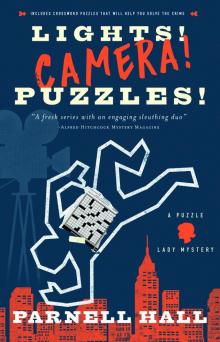 Lights! Camera! Puzzles!
Lights! Camera! Puzzles!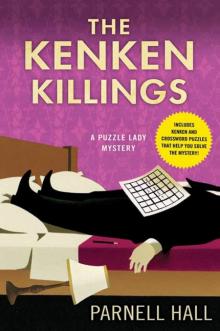 The KenKen Killings
The KenKen Killings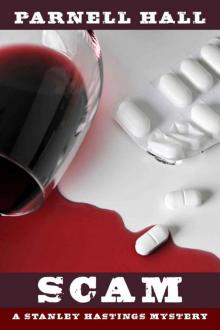 12-Scam
12-Scam The Puzzle Lady vs. the Sudoku Lady
The Puzzle Lady vs. the Sudoku Lady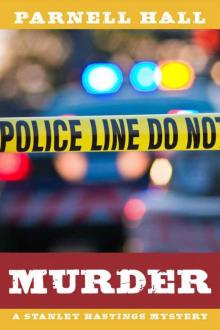 2 Murder
2 Murder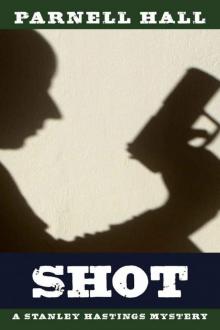 7 Shot
7 Shot You Have the Right to Remain Puzzled
You Have the Right to Remain Puzzled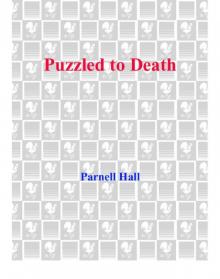 Puzzled to Death
Puzzled to Death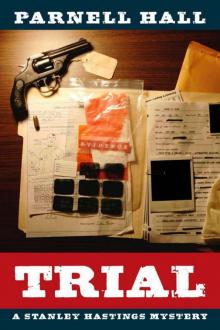 11-Trial
11-Trial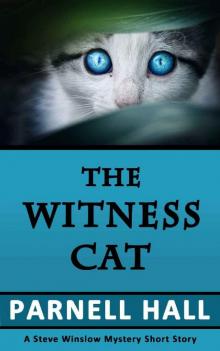 The Witness Cat (Steve Winslow Mystery)
The Witness Cat (Steve Winslow Mystery) With This Puzzle, I Thee Kill
With This Puzzle, I Thee Kill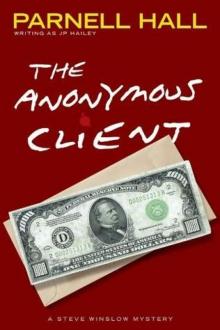 The Anonymous Client sw-2
The Anonymous Client sw-2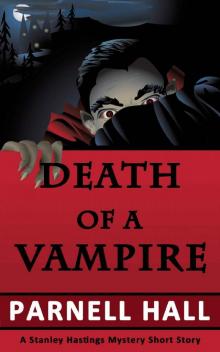 Death of a Vampire (Stanley Hastings Mystery, A Short Story)
Death of a Vampire (Stanley Hastings Mystery, A Short Story)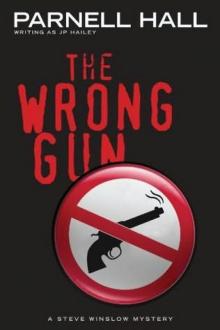 The Wrong Gun sw-5
The Wrong Gun sw-5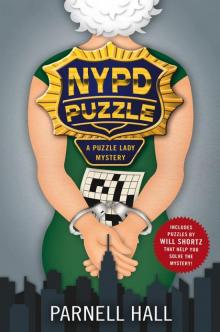 NYPD Puzzle
NYPD Puzzle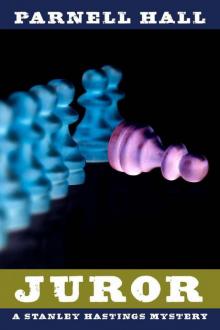 6 Juror
6 Juror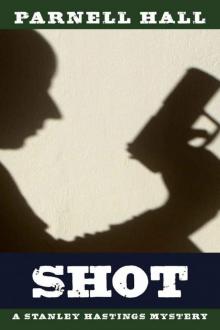 07-Shot
07-Shot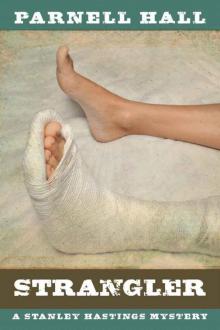 04-Strangler
04-Strangler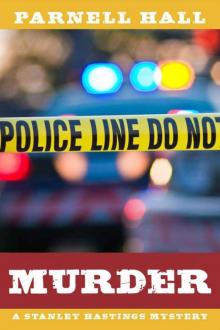 02-Murder
02-Murder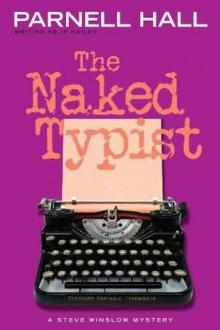 SW04 - The Naked Typist
SW04 - The Naked Typist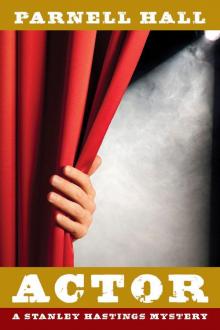 Actor
Actor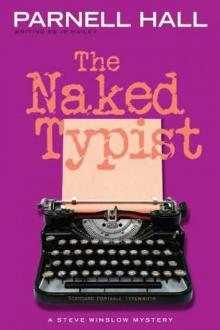 The Naked Typist sw-4
The Naked Typist sw-4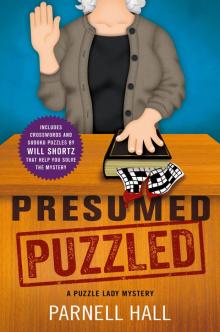 Presumed Puzzled
Presumed Puzzled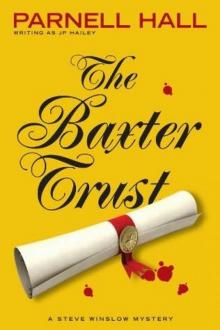 SW01 - The Baxter Trust
SW01 - The Baxter Trust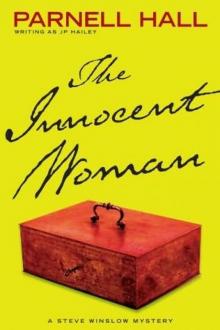 SW06 - The Innocent Woman
SW06 - The Innocent Woman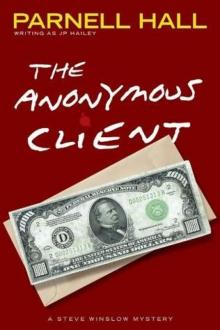 SW02 - The Anonymous Client
SW02 - The Anonymous Client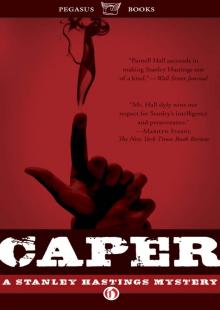 Caper
Caper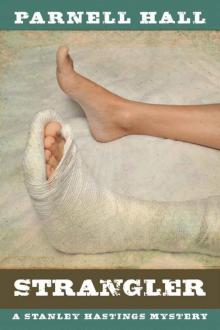 4 Strangler
4 Strangler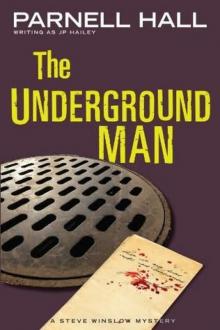 The Underground Man sw-3
The Underground Man sw-3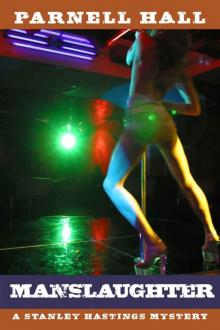 Manslaughter (Stanley Hastings Mystery, #15)
Manslaughter (Stanley Hastings Mystery, #15)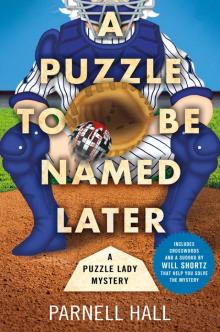 A Puzzle to Be Named Later--A Puzzle Lady Mystery
A Puzzle to Be Named Later--A Puzzle Lady Mystery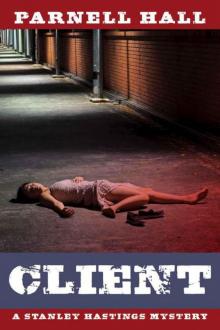 05-Client
05-Client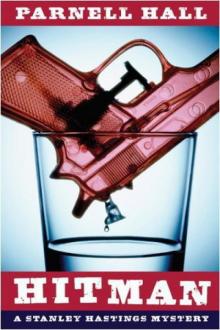 16 Hitman
16 Hitman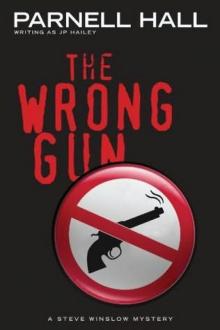 SW05 - The Wrong Gun
SW05 - The Wrong Gun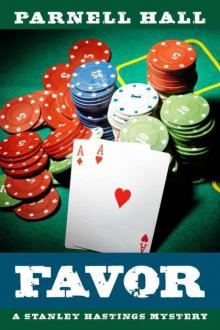 3 Favor
3 Favor Last Puzzle & Testament
Last Puzzle & Testament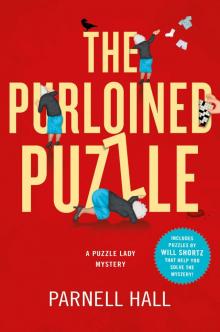 The Purloined Puzzle
The Purloined Puzzle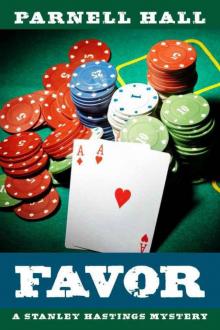 03-Favor
03-Favor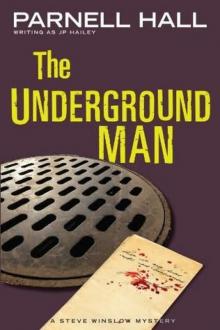 SW03 -The Underground Man
SW03 -The Underground Man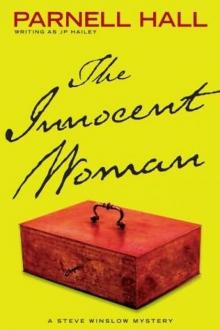 The Innocent Woman sw-6
The Innocent Woman sw-6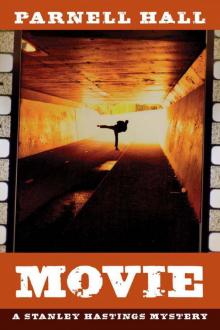 10 Movie
10 Movie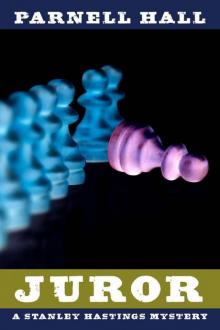 06-Juror
06-Juror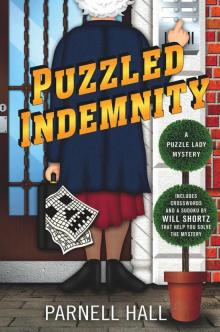 Puzzled Indemnity
Puzzled Indemnity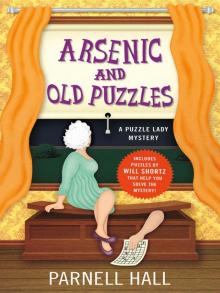 Arsenic and Old Puzzles
Arsenic and Old Puzzles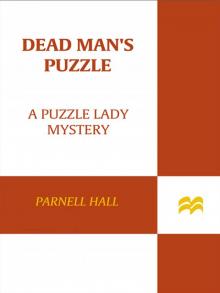 Dead Man's Puzzle
Dead Man's Puzzle Safari
Safari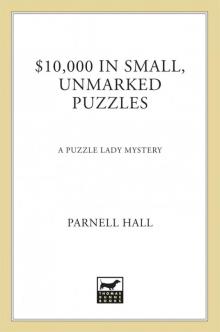 $10,000 in Small, Unmarked Puzzles
$10,000 in Small, Unmarked Puzzles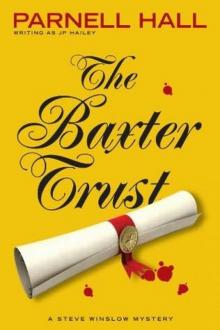 The Baxter Trust sw-1
The Baxter Trust sw-1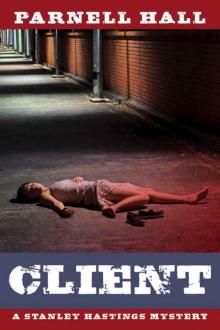 5 Client
5 Client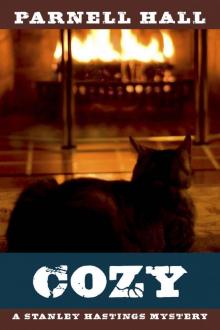 Cozy (Stanley Hastings Mystery, #14)
Cozy (Stanley Hastings Mystery, #14)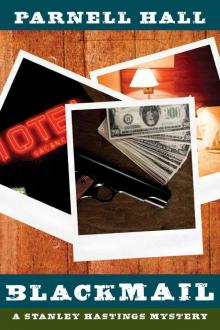 Blackmail
Blackmail A Puzzle in a Pear Tree
A Puzzle in a Pear Tree A Clue for the Puzzle Lady
A Clue for the Puzzle Lady Clicker Training (Stanley Hastings Mystery, A Short Story)
Clicker Training (Stanley Hastings Mystery, A Short Story)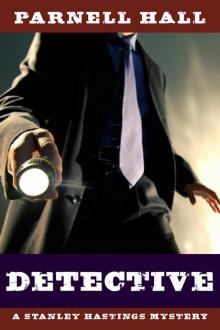 Detective (Stanley Hastings Mystery Book 1)
Detective (Stanley Hastings Mystery Book 1)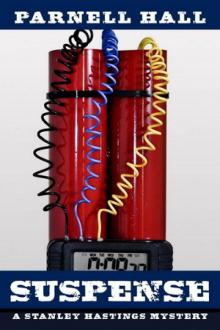 13 Suspense
13 Suspense